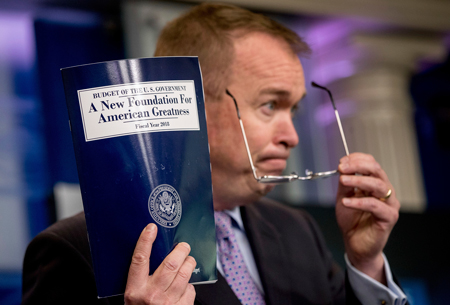The U.S. federal budget proposal for fiscal year (FY) 2018, which the Trump administration released yesterday, slashes funding for many federal science agencies. Attention now turns to Congress, which appropriates funding for federal agencies.
Scientists and environmental advocates say that the proposed budget, which the administration billed as a funding plan to “make America great again,” would weaken the country economically and reduce public health, safety, and environmental measures.
They hope that Congress will muster continued bipartisan support for Earth and space sciences, just as it did earlier this month in passing omnibus legislation to fund the government through FY 2017, which ends on 30 September. President Donald Trump signed that legislation into law even though it sharply contrasted with his FY 2018 “skinny budget” released in March that preceded the fleshed-out FY 2018 budget unveiled yesterday.
Science Agencies Take a Big Hit
“The White House’s 2018 budget plan, if it were to become law, would devastate America’s science and technology enterprise and negatively affect our nation’s economy and public well-being.”
As the skinny budget had foreshadowed, the full version of the FY 2018 budget proposal will dramatically cut discretionary funding compared to the FY 2017 budget to offset increases in military funding and other administration priorities (See Table 1).
“The White House’s 2018 budget plan, if it were to become law, would devastate America’s science and technology enterprise and negatively affect our nation’s economy and public well-being,” Rush Holt, CEO of the American Association for the Advancement of Science in Washington, D. C., said in a briefing held by the association on Tuesday.
| Table 1. Proposed Federal Budget for Selected Earth and Space Science Agencies and Departments for FY 2018a | ||||
| Federal Agency/ Department | FY 2017 Enactedb | FY 2018 Budgetb | Changeb | Percent Change |
| Department of Energy, Office of Science | 5392 | 4472 | –919 | –17.0 |
| Department of Energy, ARPA-E | 306 | 20 | –286 | –93.5 |
| Environmental Protection Agency | 8058 | 5700 | –2358 | –29.3 |
| NASA | 19,653 | 19,052 | –600 | –3.1 |
| National Science Foundation | 7472 | 6652 | –819 | –11.0 |
| National Oceanic and Atmospheric Administration | 5675 | 4775 | –899 | –15.9 |
| U.S. Geological Survey | 1085 | 922 | –163 | –15.0 |
| aSources: Budget of the U.S. Government: A New Foundation For American Greatness—Fiscal Year 2018; American Geophysical Union Public Affairs Department analysis.
bIn millions of U.S. dollars, rounded to the nearest million. |
Proposed NOAA Cuts
The budget for the National Oceanic and Atmospheric Administration (NOAA) would drop to $4.775 billion, down 15.9% from the FY 2017 budget. At NOAA, steep cuts would hit the Oceanic and Atmospheric Research Office, including that office’s Climate Research Program; the National Ocean Service; and the National Environmental Satellite, Data, and Information Service.
The proposed NOAA funding loss “would be a disaster,” former NOAA administrator Conrad Lautenbacher told Eos. “NOAA already functions on a budget well below national requirements. This reduction on top would mean the loss of vital programs that support fisheries, agriculture, transportation, ocean and coastal management, and the scientific research and development essential to national prosperity now and in the future.”
Lautenbacher served as NOAA administrator from 2001 to 2008 under President George W. Bush. He is now the CEO of GeoOptics, a Pasadena, Calif., company developing a constellation of small satellites to collect climate and environmental data.
Major Drop in Funding Requested for EPA

The Environmental Protection Agency (EPA) would receive $5.700 billion, down 29.3%. Within EPA, funding would discontinue for more than 50 programs, including the Obama administration’s Clean Power Plan to limit power plant emissions, international climate change programs, and climate change research and partnership programs.
White House Office of Management and Budget director Mick Mulvaney said that the administration is “absolutely not” antiscience, despite cuts to science agencies and climate change initiatives. “We’re simply trying to get things back in order to where we can look at the folks who pay the taxes and say, ‘Look, yeah, we want to do some climate science, but we’re not going to do some of the crazy stuff the previous administration did,’” he said.
Other Agency Cuts
The Department of Energy’s Office of Science allocation would drop to $4.472 billion (down 17.0%), with the Advanced Research Projects Agency–Energy (ARPA-E) plummeting to $20 million, down 93.5%. The administration said that the private sector is “better positioned to finance disruptive energy research and development and to commercialize innovative technologies.”
However, Kateri Callahan, president of the Alliance to Save Energy in Washington, D. C., said that ARPA-E advances high-potential and high-impact energy technologies “that are too early for private-sector investment.” She added that cuts to federal energy efficiency programs are “not the way to make America great again.”
The National Science Foundation and the U.S. Geological Survey also would lose ground under this budget, as would Earth sciences within NASA. Although the budget for NASA planetary sciences would increase 4.5% under the proposed budget, the plan basically instructs NASA “to stop looking at Earth and look at other planets,” said David Doniger, director of the climate and clean air program of the Natural Resources Defense Council, which is headquartered in New York.
Antonio Busalacchi, president of the Boulder, Colo.–based University Corporation for Atmospheric Research, worried that the administration’s proposed cuts to research into Earth system sciences would undermine scientific progress aimed at better protecting the nation from natural disasters. He said the cuts “would have serious repercussions for the U.S. economy and national security and for the ability to protect life and property.”
Reaction from Congress
“I know that many members of Congress on both sides of the aisle share my concerns about this harsh and misguided budget request.”
Democrats in Congress panned the budget proposal. With this proposal, the president has shown that “he has no intention of prioritizing investments in the [research and development] that drives our economy, keeps our nation competitive, and protects the environment and public health,” said Rep. Eddie Bernice Johnson (D-Texas), ranking member of the House Committee on Science, Space, and Technology. “I know that many members of Congress on both sides of the aisle share my concerns about this harsh and misguided budget request, and I hope and expect that by the time the appropriations process is over we will have achieved a saner outcome.”
Some Republicans also have qualms about the budget. Rep. John Culberson (R-Texas), chair of the House Appropriations Subcommittee on Commerce, Justice, Science, and Related Agencies and a strong supporter of NASA exploration, said he will ensure that his committee “strikes a balance between fiscal conservatism and funding our nation’s law enforcement agencies, space program, and scientific agencies.”
Upcoming Eos stories will provide additional coverage of the federal budget.
—Randy Showstack (@RandyShowstack), Staff Writer
Editor’s Note: AGU, which publishes Eos, issued a statement yesterday about the Trump administration’s FY 2018 budget request. The proposal “charts a course of destructive under-funding for scientific agencies,” writes AGU executive director and CEO Christine McEntee.
Citation:
Showstack, R. (2017), Federal science funding drops sharply in Trump budget plan, Eos, 98, https://doi.org/10.1029/2017EO074583. Published on 24 May 2017.
Text © 2017. The authors. CC BY-NC-ND 3.0
Except where otherwise noted, images are subject to copyright. Any reuse without express permission from the copyright owner is prohibited.

